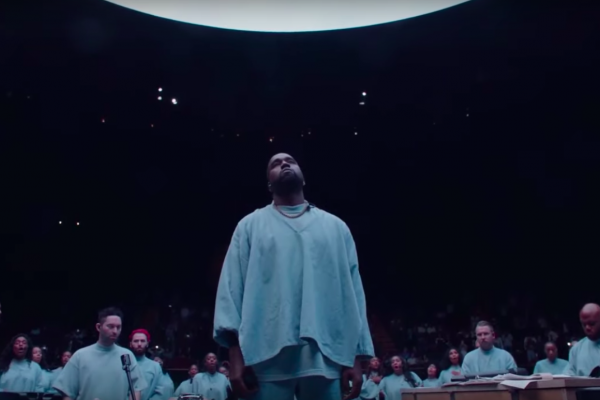In 2010, Kanye West shielded himself in a Hawaiian cave of exile. He was the most hated man in the U.S. after his astounding, drunken interruption at the Video Music Awards. The Louis Vuitton Don was dead, killed after attacking the nation’s darling Taylor Swift, and Kanye escaped across the Pacific to figure out who would come in its place.
His crowning achievement emerged, My Beautiful Dark Twisted Fantasy. Kanye’s fifth album was a remarkable and surprising reflection of what he saw in the mirror, earnestly professing his struggles handling intimacy, addiction, and power. It was Kanye’s biggest musical flex. My Beautiful Dark Twisted Fantasy was no apology for the things he’d done, but more of Kanye coming to terms with the person he really was.
Nearly a decade later on Jesus Is King, the introspection that led to his greatest work is gone. Even after the deepening of his faith amidst another wave of public scrutiny, Kanye is still the same brash walking contradiction we’ve come to know.
When Ye announced that Jesus would be a gospel album, the hip-hop world was skeptical. He promised the same for 2016's Life of Pablo, but aside from the titular reference to Peter the apostle and the track "Ultralight Beam," the album fell far short of that categorization.
Jesus Is King nears that gospel vision, but ultimately lands in the same space as Pablo. Ye’s latest work is superficially gospel. Its songs are generally faith-based, some use choirs and other traditional gospel sounds, and Kanye deftly uses his producer crown to incorporate gospel samples. Sonically, it's emblematic of post My Beautiful Dark Twisted Fantasy Kanye: occasionally dope, but largely leaving us yearning for the Old Kanye.
The album’s short 27 minutes are carried largely by “Selah,” “Follow God,” and a memorable Clipse reunion on “Use This Gospel.” Despite those stronger songs, Jesus is King feels like gospel-lite. Even though Kanye professes his love for God and weaves in biblical verses and references, it’s laden with so many spiritual contradictions that it leaves his worship falling flat. Jesus is King lacks sincerity, trying to walk listeners toward God but leaving us to question the person guiding us there.
Kanye begins his sermon on “Selah,” the second song of the album but the first where he speaks. An angelic church organ sets the scene, and Kanye jumps in at his best. It’s an aggressive, snarling profession of his faith, so confident in who he has become that he explains, “I ain’t mean, I’m just focused.” But then he references his recent controversies and doubles down on them, comparing himself to Noah. “Before the flood, people judge. / They did the same thing to Noah.” Ye doesn’t realize how hurtful it is to his fans for him to defend and support President Donald Trump, or for him to claim that African Americans chose to endure hundreds of years of slavery. In his view, his vindication is coming. With pounding drums to emphasize his preaching, Kanye even not so slyly points to his slavery comments directly at the end of the first verse by calling to John 8:33-36, where Jesus tells an audience that his teachings will set them free from the slavery of sin.
In the “On God” track, Kanye continues to chip away at his gospel intentions. He sets out to praise God for everything God’s done for Kanye, from helping him build his career and family, to surviving the 2002 car crash that broke his jaw, to sticking with him through his bouts of severe mental health issues.
But shortly after Ye begins this worship, he speaks to the hundreds of thousands of black men incarcerated around the country. He raps, “And all my brothers locked up on the yard / you can still be anything you wanna be. / Went from one in four to one in three / Thirteenth amendment, gotta end it, that’s on me.” These lyrics reference statistics that estimate one-in-three black men will be incarcerated at some point in their lives, which used to be one-in-four. Kanye’s mention of the 13th amendment does nod to some of the structural racism issues that create mass incarceration. However, his message here largely puts the onus on the victims of mass incarceration to change their fates.
This is a victim-blaming mentality that Kanye has pushed before. In his interview with Big Boy a couple weeks ago, he said, “We are locked up … we always pointing at the white people, but yet we want to spend all of our money on luxury as opposed to going and buying some land.” In “On God,” Kanye doesn’t put any responsibility for the one-in-three statistic on, for example, employers who are more likely to hire a white man with a criminal record than a black man without one.
The album comes to an emotional climax on “God Is.” The track features a sample from Rev. James Cleveland’s 1979 “God Is,” and celebrates the power of God in classic Gospel fashion. Kanye sings more than he raps here, proclaiming “I know I won’t forget all He’s done. / He’s the strength in this race that I run.” It feels like this is the album Kanye sought to make, and this is the purpose behind this album, his Sunday Service, and his public religious transformation. With his voice breaking, he concludes, “All my demons, let ‘em know / This is a mission, not a show / This my eternal soul / This my kids, this the crib / This my wife, this my life / This my God-Given right. / Thank you Jesus, won the fight.” For the first time on the album, Kanye offers the commanding sincerity he’s been trying to find.
Jesus is King is the most pointed and concise album of Kanye West’s catalogue. He had a clear goal in mind — to praise Jesus for all that he has done for Kanye. Kanye approaches that goal and this album with blinders on, trampling over his hypocrisies of his own life and the way he views the word of God. He tells us repeatedly that he doesn’t care about his critics anymore since he’s fully accepted God into his life. But the secret is with Kanye, as it always has been, he still cares a lot what we think. On Jesus is King, he is defensive of his choices that have been criticized by nearly everyone, including his fans. This time, he’s just using his faith as the latest technique to ward off anyone who challenges him.
Got something to say about what you're reading? We value your feedback!







